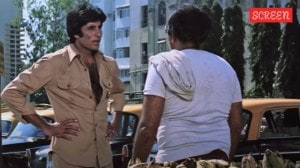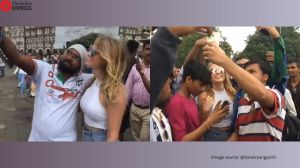Protest against Gaza violence in Delhi met with counter-demonstration
However, within minutes of the Palestinian flags and posters being displayed, a group of men, mostly local shopkeepers and workers, took umbrage at the expression of solidarity
 Organisers, including civil society activists, artists and academics, chose to hold a silent gathering of about 30 people. They said that they did not seek either police permission or “bandobast” (Express Photo)
Organisers, including civil society activists, artists and academics, chose to hold a silent gathering of about 30 people. They said that they did not seek either police permission or “bandobast” (Express Photo)For about half an hour on Saturday afternoon, the Nehru Place market — the go-to destination for repair and purchase of computers, phones and practically every other gadget – was taken over by the spectacle of a protest and a spontaneous counter-demonstration to raise questions on the protesters’ “nationalism”.
At 12:30 pm, several protesters held up placards condemning the violence in Gaza, expressing solidarity with Palestinians, condemning the Indian government’s “cooperation with Israel” and its abstention on United Nations’ resolutions against the violence.
Organisers, including civil society activists, artists and academics, chose to hold a silent gathering of about 30 people. They said that they did not seek either police permission or “bandobast”.
“The fact is that we are denied permission to gather outside the Israeli Embassy or the External Affairs Ministry. It is more feasible and creates an impact to do smaller gatherings like this one,” said economist Jean Dreze, who was among those leading the protest.
Former IAS officer and Karwan-e-Mohabbat founder Harsh Mander saw “the need for such a protest, not just to criticise the governments of Israel and India but to raise the issue of the suffering in Gaza for the public at large”.
“In Europe and the United States, there have been harsh actions against protesters, including detention and criminal action… Yet, campuses and civil society have continued to raise their voice. We haven’t seen that in India. It is, therefore, important that we go to the people.”
However, within minutes of the Palestinian flags and posters being displayed, a group of men, mostly local shopkeepers and workers, took umbrage at the expression of solidarity. They began shouting slogans such as “Jai Shri Ram” and “Bharat Mata ki Jai”.
“Ye log Bangladesh mein Hinduon ke paksh mein kabhi kyon nahi bolte? Israel mein jo atankwadi hamla hua tha, woh bhool gaye? (Why don’t these people ever speak about Hindus being killed in Bangladesh? Have they forgotten about the terrorist attack on Israel?),” said Anshul, who refused to give a last name. He repairs and sells mobile phones at one of the many kiosks in the market.
Questioning how a protest about the killing of civilians half a continent away became about nationalism and religion, Nandita Narain, a retired professor of Mathematics, St Stephen’s College, and former Delhi University Teachers’ Association President,said, “What is the connection between Ram and Palestine? Would he ever stand for children and civilians being killed? Their slogan is a political one, based on an unfortunate ignorance.”
“Ye Hindu Rashtra hai, yahan par atankwaadion ke liye support nahi milega,” said another one of the ‘counter-protesters’, who also sought anonymity. Soon, the Palestinian flags were torn, and some of the protesters were shoved and pushed.
Author Achin Vanaik said, “It doesn’t seem like they (the counter protesters) were organised, or had planned this from before… that is also disturbing.”
Constables Manoj Kumar and Sandeep Singh, who was in plainclothes, tried to get the protesters to disperse. “All we are asking is that they get permission and come. We will ensure that everything goes smoothly once they have permission… what if the situation had turned even more violent?” said Singh. “Kalkaji Police Station isn’t far… they should have got permission… I got to know only because one of the shopkeepers called and informed me of the suspicious activity,” he added.
Artist Aban Raza, who was one of the organisers, said that keeping the circle tight was a deliberate decision. “We decided to limit the number of people we asked to show up because, in the past, the police have stopped us from protesting. Their refrain is that we should seek permission, but that permission is never granted, and then, we are stopped from reaching the venue.”
Among the protesters was a consulting professional, who was both curious about how it would play out and moved by what is happening in Palestine. “I think designated ‘protest spots’ like Jantar Mantar are places to be seen. By coming to a regular, busy marketplace, we are trying to be heard.”












